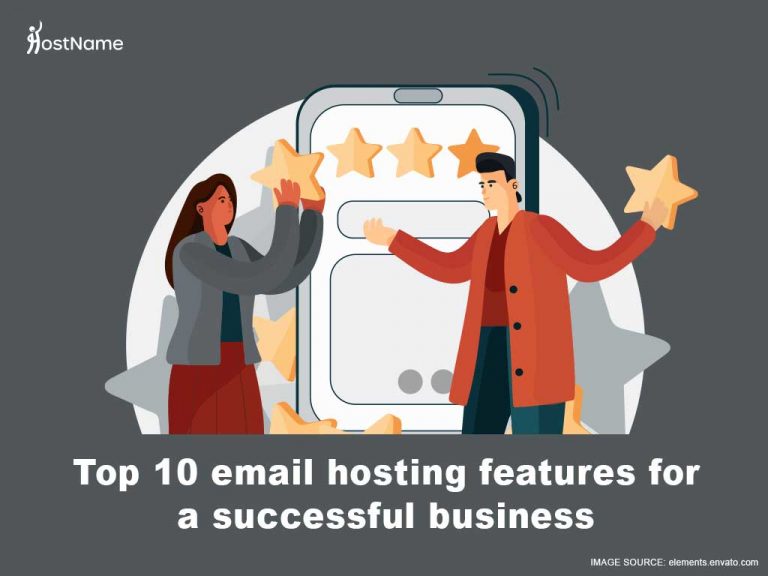You shouldn’t leave anything to chance when it comes to your business. From the web hosting provider for your website to the plugins you choose for your eCommerce page to the type of email you offer your staff: everything should be approached deliberately. Today, we highlight one of the more important factors and show you 10 of the features you should be considering for your business’ success. Today, we look at hosted email exchange.
Table of Contents
Why get email hosting?

Apart from your web host, you also will need an email hosting provider. Usually, you can have the same provider offering both services, which is generally the recommended way to go, but you do not have to. Since you already have Monsterhost web host, it is a good time to introduce you to our hosted email exchange services. Below you will find 10 of the features every serious business owner and website professional need in their email service.
Top 10 Email Hosting Features
1. Mailbox Size
Sometimes you may see the number of email accounts that you are allowed. Other times, you will see the overall amount of space you will be allocated for email accounts. 100 GB is a great starting point since you will need to ensure you have enough space for all your employees, yourself and the projected growth you see in your business’ future.
2. White label domains
This really means that your email hosting provider allows you to use your own company’s name as the domain in your email address. Research shows that customers and potential customers trust email addresses more that are ‘@companyX.com’, as opposed to a generic one, such as Gmail or Yahoo. So, if your company’s name is Better Beers, you can have an email address such as ‘[email protected]’.
3. Syncing
Being glued to a computer is just not ‘21st century’, so your email must move with you. Also, desktop computer use has been surpassed by mobile devices. You need an email hosting provider that can allow you to move but remain accessible. Customers and business will not wait until you are in the office; your email shouldn’t either. Syncing your emails across devices screams efficient and effective.
4. Aliases
If you are to seriously consider adopting some of these features, you must first know what they are. An email alias is a secondary email address that feeds into another email address. Let’s use an example to make it clearer. If you are the CEO, you might have ‘[email protected]’, but you may also want to have one with your name, such as ‘[email protected]’. Aliases allow you to merge the two accounts so that anyone who emails the latter for example, you will receive it in the inbox of the former.
Of course, this requires some technical work in the background of your email hosting account, but your concern is that you and your employees use the least amount of time to get the greatest amount of work done. Email aliases help with that, so look for a plan that offers unlimited numbers of them.
5. Tasks
Another feature to enhance efficiency is tasks. Shared tasks keep you in the loop even when you are away, or help you remain in charge of your time. Team members can collaborate on multi-stakeholder projects seamlessly, and generally remotely (a key consideration these days).
6. Distribution lists
We can’t say this enough: working efficiently is the main ingredient for a successful business, to bring about work-life balance, and to foster team spirit. Distribution lists are yet another feature that will help achieve this goal. Distribution lists allow you to create groups or lists of frequently emailed contacts without having to enter each address each time. Imagine the time you save.
7. Disclaimers
Sending out sensitive information? Want to remind recipients to only print if necessary? Is there a legal obligation that you must share with all your recipients each time you email them? You need a company disclaimer, and your email hosting provider is where you are equipped to add one. Email disclaimers are statements you include usually at the end of emails to limit liability.
8. White and blacklists
Generally, email filters are very good at deciphering which emails are spam and ensure these end up in the spam folder and vice versa. Though, there are times when this isn’t the case. A whitelist is a group of email addresses you always want coming to your inbox and a blacklist is a group of emails you want to always go to your spam folder.
9. Personalisation options
Your email hosting service should help you reinforce in your customers the idea that you are legitimate and can be trusted. In addition to personalized email addresses, you can do this by including company logos and other information in the body of the email so that they appear on every email.
Another option is the ability to include email signatures. This adds a face to the email, and not only reassures customers of your legitimacy but supplies them with contact information should they wish to use other another means of getting through to you.
10. Permissions
The final and one of the coolest features we look at is the ability to send emails as someone else. If you have administrative assistants or others who need to send emails on your behalf constantly, then this is a must-have on your email hosting account. These are called various names, but they really are all sending permissions. Sending permissions are more professional in appearance and can eliminate the need to add “sent on behalf of…” in the body of the text.
Conclusion
Several nifty features come with email hosting. Some help to build brand credibility, while others enhance efficiency. Choose the ones that you require for your business, and enjoy the satisfaction of knowing you are using some of the best email hosting features successful businesses across the globe are using.






